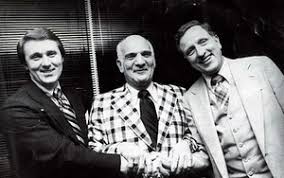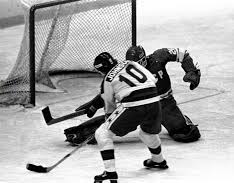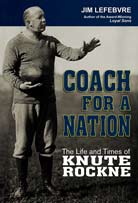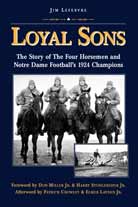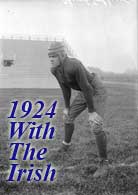This weekend, we celebrate the 40th anniversary of what’s widely regarded as the greatest sports moment in American history, the U.S. Olympic hockey team’s titanic upset of the Soviet Union at the 1980 Winter Games of Lake Placid.
The “Miracle on Ice.”
It was truly a “remember where you were” moment, when hockey crossed all sorts of cultural lines and brought a nation together in delirious celebration.
I was a young sports writer at the time, specializing in college hockey, and had the opportunity to cover all 20 U.S. gold-medal players during their collegiate careers.
You might say I was present for “the making of the miracle.”
And without a doubt, the rivalries, great games, legendary coaches and talented players of the time made for a “golden age” of U.S. college hockey.
Over the years, as the U.S. 1980 victory has entered the pantheon of sports legend, some have characterized the U.S. team as a rag-tag bunch of college kids, as if they were thrown together over a weekend and sent to Lake Placid to represent their country.
Make no mistake – the 4-3 victory over the Soviet machine, the world’s most dominant team, on Feb. 22, 1980, was an upset for the ages.
But it was possible because the team led by Coach Herb Brooks included 20 “remarkable young men” who proved themselves in a time of intense competition among their peers.
 For three summers, in 1977-79, a pool of 80 aspiring Olympic hockey players gathered in Colorado Springs for the annual Olympic Festival. Separated into four teams, coached by the leading mentors of the college game, they battled for numerous days at each Festival, attempting to prove their mettle.
For three summers, in 1977-79, a pool of 80 aspiring Olympic hockey players gathered in Colorado Springs for the annual Olympic Festival. Separated into four teams, coached by the leading mentors of the college game, they battled for numerous days at each Festival, attempting to prove their mettle.
The docudrama film “Miracle” is, for my money, the finest sports film ever made, and incredibly true to history. But, in the interest of time, it also severely condenses the process of what created the “Miracle on Ice” team, giving the impression they had one quick workout before selection.
In truth, tryouts took place not just at the three Olympic Festivals, but during the college seasons leading up to the 1980 Games.
Take the 1978-79 season in the Western Collegiate Hockey Association alone. A war each week. Fully 70% of the gold medal team came out of the four schools which battled for the gigantic MacNaughton Cup, emblematic of WCHA supremacy, that year. When the regular season ended, the four teams – North Dakota, Minnesota, Minnesota-Duluth and Wisconsin – were separated by a mere four points in the standings. Lefty Smith’s Notre Dame Fighting Irish finished a strong fifth, and the bottom half of the league that year included perennially-strong programs led by legendary, NCAA-title winning coaches Murray Armstrong at Denver, John MacInnis at Michigan Tech and Amo Bessone at Michigan State. Every night, it seems, was a battle royale.
Suffice it to say, there was talent aplenty in the U.S. at the time.
In the 1977 NCAA finals at Detroit’s Olympia Stadium, Bob Johnson’s Wisconsin Badgers took the title with a 6-5 overtime win against Michigan, while Mike Eruzione completed his college career by leading Boston University to third place. The following year at Providence, Eruzione’s mates – including Jack O’Callahan, Dave Silk and Jim Craig – took the crown to cap a 30-2 season. Bowling Green, led by future Olympians Ken Morrow and Mark Wells, topped Wisconsin for third place.
In 1979, the powerful WCHA prevailed through the NCAA tourney, with Brooks’ Minnesota team taking the title against North Dakota, 4-3, with “Miracle” teammates Steve Christoff, Phil Verchota, Eric Strobel and Neal Broten registering points, with Steve Janaszak in goal.
The following summer, Brooks made his selections for Team USA, providing his famous quote, “I don’t want the best players, I want the right players.”
I knew Herb Brooks. I covered his teams on many occasions, But I never had the chance to ask him if he had heard of Knute Rockne’s words: “I don’t play my eleven best players, but my best eleven.”
Who will be the best team player? Who will sacrifice individual glory for the good of the team? Who will make those around him even better, through incredible dedication and effort?
I’ve often said, for so many sports fans today, if the name Rockne resonates at all, it’s for his skill as a locker-room orator. I can prove (through Google analytics) that the majority of references to Rockne these days is along the lines of a current coach “going Rockne” in a pep talk.
True, Rockne had a few legendary locker-room speeches. But they were just a sliver of his coaching genius. He excelled through the relationships he built with players and the strong-willed loyalty they engendered. Added to a multi-faceted perfection of the Xs and Os of the game. And, putting the right players together to create success.
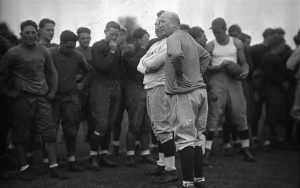 Rockne strived for the “perfect play,” which could score from anywhere on the field. It happened when all 11 men carried out their assignment to perfection.
Rockne strived for the “perfect play,” which could score from anywhere on the field. It happened when all 11 men carried out their assignment to perfection.
Rockne coached the inimitable George Gipp, clearly one of the greatest talents ever to set foot on a gridiron. Running, passing, kicking, defending…Gipp could do it all, in a seemingly effortless manner, never rushed or pressured. Off the field, of course, he created problems with his devil-may-care attitude toward things like practice and schoolwork.
After Gipp’s death in December of 1920, Rockne confided to a friend that, as great a talent as Gipp had been, Rock’s preference was to build a true team in which everyone played a key role. He did just that with the group that arrived on campus in 1921. As seniors in 1924, the 11 of them became known as the Four Horsemen and the Seven Mules, and they captured Notre Dame’s first consensus national championship.
You could say that Rockne envisioned his championship three years before it happened.
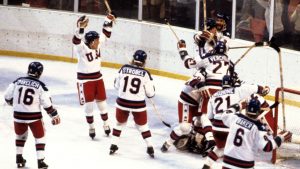 For the 1980 U.S. Olympic team, the years leading up to the Lake Placid Games were also instrumental in building up to a singular moment when it all came together.
For the 1980 U.S. Olympic team, the years leading up to the Lake Placid Games were also instrumental in building up to a singular moment when it all came together.
In Madison, Wisconsin, Coach Bob Johnson had built a consistent winner at UW. (By the way, he was never called “Badger Bob” in those days. That came later, when he went to the NHL. At UW, he was simply “Coach” or “Hawk,” his long-time nickname.)
Johnson had a Rockne-like intensity for exploring every possible detail which could lead to success. If he learned that the Swedish national team was drinking strawberry milkshakes, I often said, he would have the UW Dairy Dept. looking into it on Monday.
Sunday has always been the traditional day off in college hockey, with neither games nor practice scheduled. And that’s when Johnson would open the ice to what were called “the Russian games” – pickup hockey including Badger players and coaches, hangers-on, and yes, the coach’s son, young Mark.
There was just one rule – the only person who could portray himself as Kharlamov, the Soviet star, was Coach Johnson himself. It was truly pond hockey, with everyone trying to emulate the moves of the globe’s greatest players.
And the coach’s son, Mark, turned into a fabulous one. The purest goal scorer of his time, I would argue. He played 125 games for the University of Wisconsin and scored 125 goals. A record never likely to be equaled.
And on Feb. 22, 1980, he scored an amazing last-second goal to end the first period, then another to tie the game in the third, setting up Eruzione’s game-winner. Two days later, Johnson’s goal put the finishing touch on Team USA’s 4-2 comeback victory over Finland for the gold medal.
But it all worked. Everybody was where they needed to be.
Like Rockne, Herb Brooks had picked the right players…and put them in the right position to win.
“You were born to be hockey players….you were meant to be here.”
